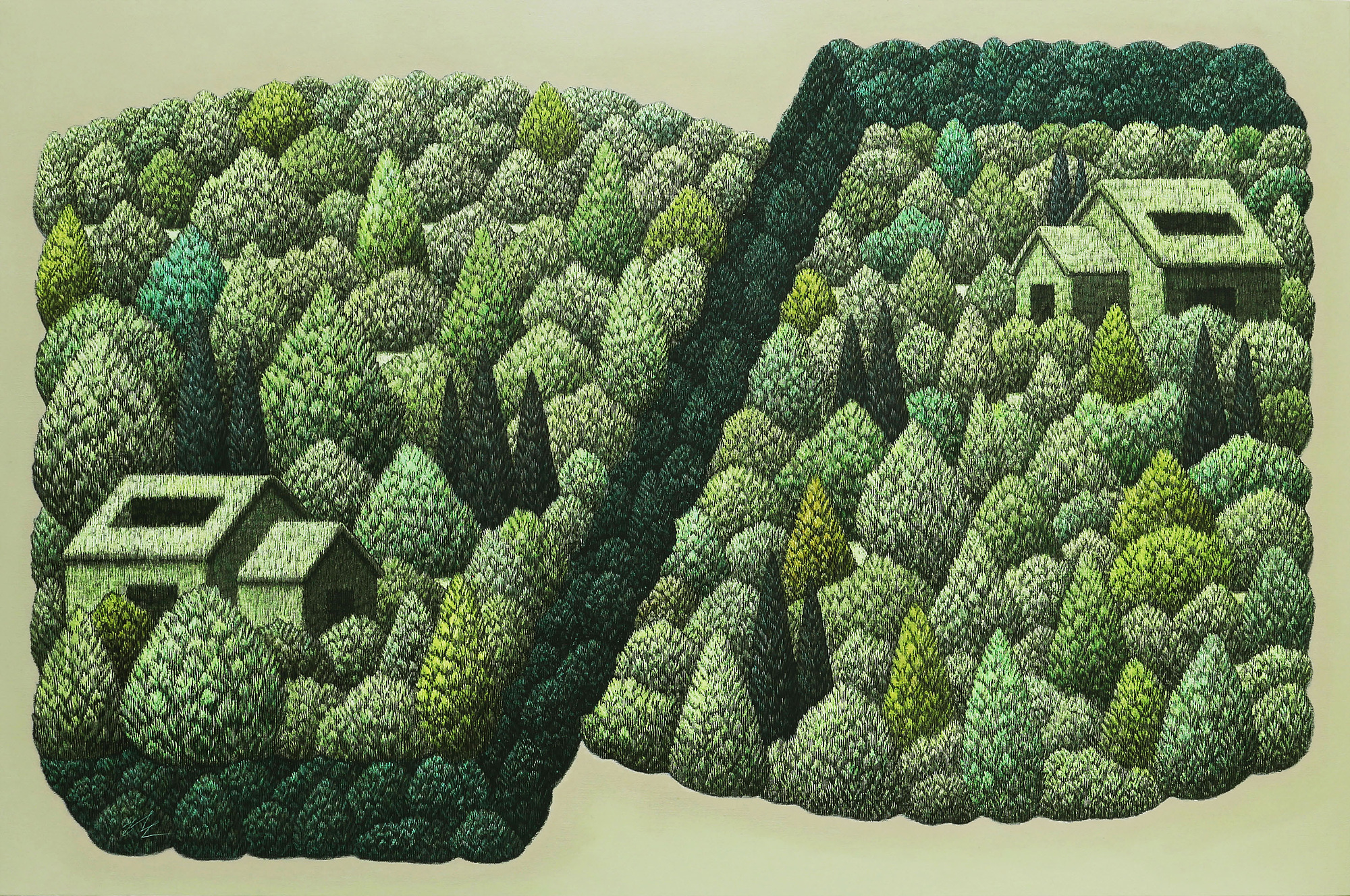Everything Is Fine
| [GALLERIES] PERROTIN SEOUL
2021.8.26 – 10.1
닉 도일

유명 상표의 쉐이빙 크림, 자판기, 올덴버그의 작품처럼 초대형으로 만들어진 일상용품 등… 팝아트의 전략에 기반한 닉 도일의 작품은 우리가 쉽게 인식 가능한 형상들에 초점을 맞춘다. 팝아트에 대한 전율은 대상에 대한 기념 혹은 비판을 기반으로 장난기 있는 양가성에 기초하지만, 도일은 주로 그 후자에 대한 관심이 깊다. 작품을 통해 그는 이 친숙한 오브제 속에 숨어있는 어두운 심리적 암류를 파헤친다.
전시 “Everything Is Fine”은 남성성을 상징하는 소품을 지속적으로 탐구하는 도일의 작품 세계의 연장선이다. 나비넥타이, 신사화, 그리고 세면도구 세트에 들어있을 법한 내용물들은 도일이 탐구하고 비평하길 원하는, 익명이며 동시에 여럿인 일반적인 미국 남자들의 개인적인 모습의 한 부분인 것이다.
도일은 남성적으로 인식되는 오브제들의 무익함을 드러낸다. 여행 가방은 그것이 나타낼 법한 정처 없는 자유 대신 드러난 텅 빈 내부 속으로 고독함이 스며들어있다. 냉온수기는 그것의 위치가 의미하는 회사 속 모임과 경쟁을 의미하는 대신 홀로 황량하게 놓여있다. 스위스 아미 나이프는 마치 공작새처럼 자신이 가진 것을 뽐내고 있지만, 이 공연을 관람하는 관중은 없다. 고도의 예술적 기교를 보여주는 듯한 이 모든 노력은 실패로 돌아갈 수밖에 없는 운명인 듯하다.

두 개의 올가미, 나비넥타이, 벨트 등 질식시키는 많은 도구가 성별화된 이상의 숨 막히는 본질에 대한 메타포로 사용된다. 도일은 남성성의 편협함, 감정을 표현하고 느끼는 것에 대한 두려움은 비극으로 치달을 수밖에 없다고 인식한다. 물론 작품의 첫인상에서는 이런 요소들이 직접적으로 다가오진 않는다. 이 오브제들은 마치 범죄 현장의 사진처럼 감정 없이, 그리고 단도직입적으로 나타난다. 하지만 증거 서류가 더 큰 현장에 대한 많은 이야기를 내포하고 있는 것처럼 도일의 작품 또한 그러하다.
도일의 작품 속에서 재료는 그저 목적을 달성하기 위한 수단이 아니라 더 크고 전반적인 그림에 부여되는 고유 속성이다. 도일이 선호하는 재료인 데님은 미국의 역사 속 많은 부분을 거론한다. 서아프리카에서의 인디고 수입 과정의 많은 문제와 사실상 노동자들의 작업복으로 받아들여지는 동시에 반문화 운동의 기표로서 사용되는 데님은 상징성 있는 만큼 교묘하게 영악하다.
작가는 창작을 위한 재료로 베지터블 가죽을 새로 도입하였다. 안장을 만드는 용도로 사용되기도 하는 이 재료를 작품 속으로 끌어드린 도일은 이를 통해 미국 카우보이의 신화 같은 존재를 소환한다. 그는 개념적 기교를 통해 그들의 투박한 성향을 암시한다. 작품 ‘Outlaw’에서는 나무로 만들어진 여행 가방 속에서 선인장의 축 처진 팔이 쏟아져 나온다. 선인장을 구속하지만 동시에 그 반대편에는 아무것도 묶여있지 않은 한 쌍의 수갑은 점점 져가는 미국 서부의 모습, 특히 미국 서부가 역사적으로 상징했지만 좀처럼 이뤄지지 않았던 자유와 도망을 상징한다.

도일은 일상의 단조로움과 상상 속 미국의 장엄함을 대조한다. 작가의 ‘Executive Toys’ 시리즈의 신작인 ‘No One Can Know’는 지쳐 체념한 개인의 회사 속 모습을 보여준다. 손잡이를 돌리면 기어가 작동하여 책상에 앉아 있는 사람을 닮은 나무 조각이 움직인다. 작품의 상세한 메커니즘은 사용된 복잡한 기술과 노동이 필요로 하는 영혼 없는 반복성을 보여주기 위해 훤히 드러나 있다. 사람 모습의 조각상은 주의 산만하게 발로 툭툭 바닥을 치며, 컴퓨터 모니터에서 고개를 돌려 서랍 속 무방비하게 꿈을 꾸며 자는 자신의 모형을 보여준다.

전시의 제목은 “모든 게 괜찮다”며 확신을 하지만 도일의 시선 속 비친 미국에서의 삶은 오히려 불안한 기운이 감돈다. 그의 작품 속 겸손한 모습의 물건들은 급선회한다. 멀티탭은 올가미로 형상화되었으며, 면도날은 번뜩이며 날카롭게 유인하고, 배수구는 끝이 없는 절망을 표현하여 모든 물건은 모두 치명적인 필연으로 향해 있다.

페로탕 서울
서울시 종로구 팔판길 5
+82 2 737 7978











